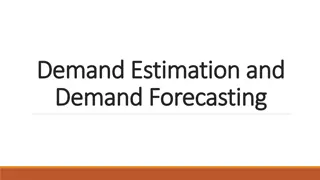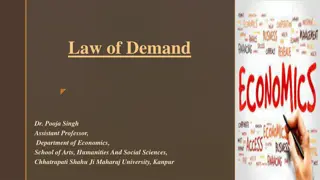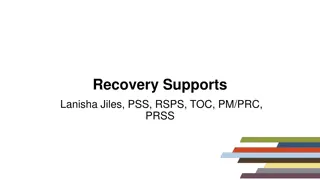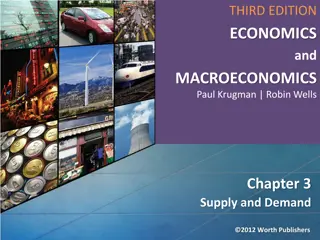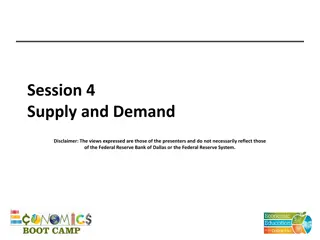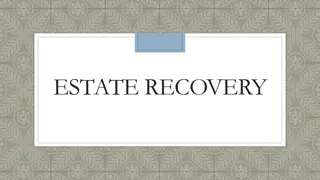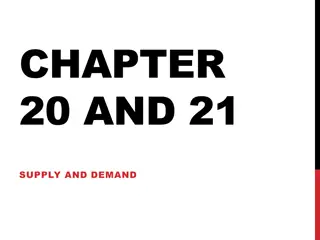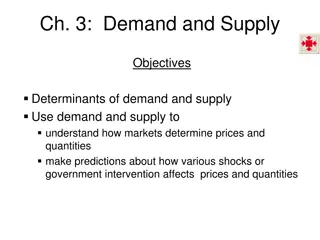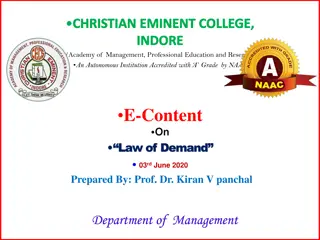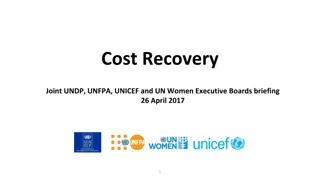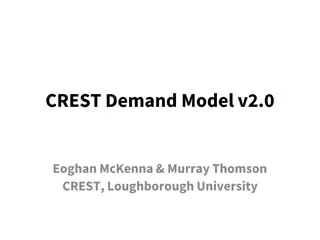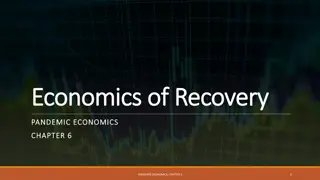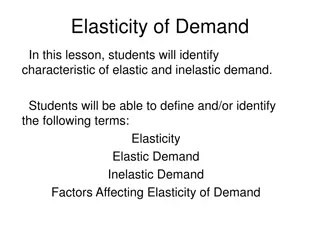Demand and Recovery
Partner at S. Khaitan & Associates, specializing in Tax & Regulatory matters. Email ID: shubham@cakhaitan
Download Presentation

Please find below an Image/Link to download the presentation.
The content on the website is provided AS IS for your information and personal use only. It may not be sold, licensed, or shared on other websites without obtaining consent from the author.If you encounter any issues during the download, it is possible that the publisher has removed the file from their server.
You are allowed to download the files provided on this website for personal or commercial use, subject to the condition that they are used lawfully. All files are the property of their respective owners.
The content on the website is provided AS IS for your information and personal use only. It may not be sold, licensed, or shared on other websites without obtaining consent from the author.
E N D
Presentation Transcript
Demand and Recovery By CA Shubham Khaitan, B.COM (Honours), FCA, LLB, ACS, CFA(USA), DISA (ICAI) Partner - Tax & Regulatory, S. Khaitan & Associates Email ID: shubham@cakhaitan.com, Phone No. 03340687062, +919831912725 Website: www.cakhaitan.com
Tax not paid or short paid or erroneously refunded Section 73 & 74 Notice shall be served by the proper officer if : Tax not paid Tax short paid Erroneously refunded Input tax credit wrongly availed or utilized Section 74(1) Section 73(1) If proven, notice deemed to be issued u/s 73(1) not fraud or any wilful misstatement or suppression of facts to evade tax other than fraud or any wilful misstatement or suppression of facts to evade tax to showcause why tax along with interest u/s 50 and penalty as per the provisions of the Act or rules is not payable to showcause why tax along with interest u/s 50 and penalty equivalent to the tax +91 98319 12725 Shubham@cakhaitan.com 07-03-2025 2 Shubham Khaitan [B.Com(Hons),LLB,FCA,ACS,CFA(US),DISA]
Tax not paid or short paid or erroneously refunded Section 73 & 74 Time limit for issuance of Notice and Order : Particulars Particulars Section 73 Section 73 Section 74 Section 74 Time limit for issuing show cause notice 3 months prior to the time limit specified under section 73(10) for issuance of an order [73(2)] 6 months prior to the time limit specified under section 74(10) for issuance of an order [74(2)] Time limit for issuing order 3 years from the due date for furnishing annual return for the financial [73(10)] 5 years from the due date for furnishing annual return for the financial [74(10)] year year 75(1). To exclude the period for which the service of notice or issuance of order is stayed by a court or Appellate Tribunal is stayed 75(10). Adjudication deemed to be concluded if order not issued within the above time period 75(11). If any authority has given decision prejudicial to the interest of revenue and appeal is preferred to AT/HC/SC, period between the two decisions to be excluded
Tax not paid or short paid or erroneously refunded Section 73 & 74 Section 73(3) / 74(3) - Where a notice has been issued for any period under sub-section (1), the proper officer may serve a statement, containing the details of tax not paid or short paid or erroneously refunded or input tax credit wrongly availed or utilised for such periods other than those covered under sub- section (1), on the person chargeable with tax. Section 73(4) Section 73(4) Section 74(4) Section 74(4) (4) The service of such statement shall be deemed to be service of notice on such person under sub-section (1), subject to the condition that the grounds relied upon for such tax periods other than those covered under sub-section (1) are the same as are mentioned in the earlier notice. (4) The service of statement under sub-section (3) shall be deemed to be service of notice under sub- section (1) of section 73, subject to the condition that the grounds relied upon in the said statement, except the ground of fraud, or any wilful misstatement or suppression of facts to evade tax, for periods other than those covered under sub-section (1) are the same as are mentioned in the earlier notice. Held that when the first SCN was issued all the relevant facts were in the knowledge of the authorities. Later on, while issuing the second and third show cause notices the same/similar facts could not be taken as suppression of facts on the part of the taxpayer as these facts were already in the knowledge of the authorities. [Nizam Sugar Factory v. Collector 2006 (197) E.L.T. 465 (SC)] +91 98319 12725 Shubham@cakhaitan.com 07-03-2025 4 Shubham Khaitan [B.Com(Hons),LLB,FCA,ACS,CFA(US),DISA]
Tax not paid or short paid or erroneously refunded Section 73 & 74 Sec 73 Sec 74 Particulars Particulars Amount of penalty Amount of penalty Particulars Particulars Amount of penalty Amount of penalty Before service of show cause notice [74(5)] 15% of tax to be paid along with tax and interest Before service of show cause notice [(73(5)] No penalty if tax paid with interest (own or ascertained) dept Within 30 days after the issuance of show cause notice [74(8)] 25% of tax to be paid along with tax and interest Within 30 days after the issuance of show cause notice [73(8)] No penalty if tax paid with interest Within 30 days from the communication of order [74(11)] 50% of tax to be paid along with tax and interest In any other case [73(9)] 10% of the tax or Rs. In any other case [74(9)] 100% of tax 10,000 whichever is higher +91 98319 12725 Shubham@cakhaitan.com 07-03-2025 5 Shubham Khaitan [B.Com(Hons),LLB,FCA,ACS,CFA(US),DISA]
Tax not paid or short paid or erroneously refunded Section 73 & 74 Section 73 Section 73 Section 74 Section 74 73(6) -The proper officer, on receipt of such information, shall not serve any notice under sub- section (1), or, as the case may be, the statement under sub-section (3), in respect of the tax so paid or any penalty payable under the provisions of this Act or the rules made thereunder 74(6) - The proper officer, on receipt of such information, shall not serve any notice under sub- section (1) in respect of the tax so paid or any penalty payable under the provisions of this Act or the rules made thereunder. Section 73(7) / 74(7) - Where the proper officer is of the opinion that the amount paid under sub- section (5) falls short of the amount actually payable, he shall proceed to issue the notice as provided for in sub-section (1) in respect of such amount which falls short of the amount actually payable. 73(9) - The proper officer shall, after considering the representation, if any, made by person chargeable with tax, determine the amount of tax, interest andapenalty equivalent to ten per cent. of tax or ten thousand rupees, whichever is higher, due from such person and issue an order. [Mandatory Penalty - ?] 74(9) - The proper officer shall, after considering the representation, if any, made by the person chargeable with tax, determine the amount of tax, interest and penalty due from such person and issue an order. +91 98319 12725 Shubham@cakhaitan.com 07-03-2025 6 Shubham Khaitan [B.Com(Hons),LLB,FCA,ACS,CFA(US),DISA]
Tax not paid or short paid or erroneously refunded Section 73 & 74 Q. Whether penalty in accordance with section 73 (11) of the CGST Act should be levied in cases where the return in FORM GSTR-3B has been filed after the due date of filing such return? 1. As per the provisions of section 73(11) of the CGST Act, penalty is payable in case self-assessed tax or any amount collected as tax has not been paid within a period of thirty days from the due date of payment of such tax. 2. It may be noted that a show cause notice (SCN for short) is required to be issued to a person where it appears to the proper officer that any tax has not been paid or short paid or erroneously refunded or where input tax credit has been wrongly availed or utilised for any reason under the provisions of section 73(1) of the CGST Act. The provisions of section 73(11) of the CGST Act can be invoked only when the provisions of section 73 are invoked. 3. The provisions of section 73 of the CGST Act are generally not invoked in case of delayed filing of the return in FORM GSTR-3B because tax along with applicable interest has already been paid but after the due date for payment of such tax. It is accordingly clarified that penalty under the provisions of section 73(11) of the CGST Act is not payable in such cases. It is further clarified that since the tax has been paid late in contravention of the provisions of the CGST Act, a general penalty under section 125 of the CGST Act may be imposed after following the due process of law. [Practical implication Section 73(11)- ??] +91 98319 12725 Shubham@cakhaitan.com 07-03-2025 7 Shubham Khaitan [B.Com(Hons),LLB,FCA,ACS,CFA(US),DISA]
Tax not paid or short paid or erroneously refunded Section 73 & 74 Explanation 1: (i) the expression all proceedings in respect of the said notice shall not include proceedings under section 132; (ii) where the notice under the same proceedings is issued to the main person liable to pay tax and some other persons, and such proceedings against the main person have been concluded under section 73 or section 74, the proceedings against all the persons liable to pay penalty under sections 122, 125, 129 and 130 are deemed to be concluded Section 75(13). Where any penalty is imposed under section 73 or section 74, no penalty for the same act or omission shall be imposed on the same person under any other provision of this Act. +91 98319 12725 Shubham@cakhaitan.com 07-03-2025 8 Shubham Khaitan [B.Com(Hons),LLB,FCA,ACS,CFA(US),DISA]
Meaning of Suppression Suppression to mean non declaration of facts or information which a taxable person is required to declare in the return, statement, report or any other document under the Act or failure to furnish any information being asked by the PO What if disclosed in financials? Not preceded by any wilful suppression? What happens to inadvertent omission? Accompanied by very strong words such as fraud or willfulmisstatement ? Can suppression if shown in the financial statements? In the case of Pushpam Pharmaceuticals Company v. Collector of Central Excise , it was held that, when facts were known to both the parties, the omission by one to do what he might have done not that he must have done would not render it suppression. It is settled law that mere failure to declare does not amount to willful suppression. There must be some positive act from the side of the taxpayer to find willful suppression. +91 98319 12725 Shubham@cakhaitan.com 07-03-2025 9 Shubham Khaitan [B.Com(Hons),LLB,FCA,ACS,CFA(US),DISA]
Whether opportunity of being heard is required before invoking 75(12)? 75(12). Notwithstanding anything contained in section 73 or section 74 [not 75?], where any amount of self-assessed tax in accordance with a return furnished under section 39 remains unpaid, either wholly or partly, or any amount of interest payable on such tax remains unpaid, the same shall be recovered under the provisions of section 79. 75(4). An opportunity of hearing shall be granted where a request is received in writing from the person chargeable with tax or penalty, or where any adverse decision is contemplated against such person 79(1). Where any amount payable by a person to the Government under any of the provisions of this Act or the rules made thereunder is not paid, the proper officer shall proceed to recover the amount by one or more of the following modes, namely :- +91 98319 12725 Shubham@cakhaitan.com 07-03-2025 10 Shubham Khaitan [B.Com(Hons),LLB,FCA,ACS,CFA(US),DISA]
Whether opportunity of being heard is required before invoking 75(12) The words "any amount payable" is to be interpreted in the context in which it has been used and the amount payable (unless admitted) can only be determined by initiating adjudication process as provided under Section 73 or 74 of the CGST Act. [Mahadeo Construction Co v. Union of India [2020] 116 taxmann.com 262 (Jharkhand)] Even though the liability to pay interest under Section 50 is an automatic liability, still the quantification of such liability, certainly, cannot be by way of an unilateral action, more particularly, when the assessee disputes with regard to the period for which the tax alleged to have not been paid or quantum of tax allegedly remains unpaid. [CGST v. Daejung Moparts Pvt. Ltd. and ors] Where there was a failure on the part of the assessee to pay the tax within the period prescribed, the assessee is entitled to be heard as he could produce the material on record proving that there was no delay in payment of tax. Principles of natural justice still ought to be followed before making of any demand. [LC Infra Projects (P) Ltd vs Union of India [2019] 109 taxmann.com 141 (Karnataka)] +91 98319 12725 Shubham@cakhaitan.com 07-03-2025 11 Shubham Khaitan [B.Com(Hons),LLB,FCA,ACS,CFA(US),DISA]
Can notice be issued under 122(2) instead of 73 and 74? 122 (2) Any registered person who supplies any goods or services or both on which any tax has not been paid or short paid or erroneously refunded, or where the input tax credit has been wrongly availed or utilised, (a) for any reason, other than the reason of fraud or any wilful misstatement or suppression of facts to evade tax, shall be liable to a penalty of ten thousand rupees or ten per cent. of the tax due from such person, whichever is higher; (b) for reason of fraud or any wilful misstatement or suppression of facts to evade tax, shall be liable to a penalty equal to ten thousand rupees or the tax due from such person, whichever is higher. Can notice be issued under Section 122(2)? Is it applicable to a taxable person who is not registered? +91 98319 12725 Shubham@cakhaitan.com 07-03-2025 12 Shubham Khaitan [B.Com(Hons),LLB,FCA,ACS,CFA(US),DISA]
Can notice be issued under 122(2) instead of 73 and 74? 122 (1) Where a taxable person who (xi) is liable to be registered under this Act but fails to obtain registration he shall be liable to pay a penalty of ten thousand rupees or an amount equivalent to the tax evaded or the tax not deducted under section 51 or short deducted or deducted but not paid to the Government or tax not collected under section 52 or short collected or collected but not paid to the Government or input tax credit availed of or passed on or distributed irregularly, or the refund claimed fraudulently, whichever is higher. Can we pay 10% of tax or Rs. 10000 which is higher in case of an unregistered person liable to pay tax? +91 98319 12725 Shubham@cakhaitan.com 07-03-2025 13 Shubham Khaitan [B.Com(Hons),LLB,FCA,ACS,CFA(US),DISA]
Some other principles of SCN u/s 75 PO can adjourn the personal hearing for reasons recorded in writing if sufficient cause is shown [adjournment cannot be granted for more than 3 hearings] Amount of tax, interest and penalty as per the order <= Amount specified in notice No demand to be confirmed on grounds other than the grounds provided in notice PO to set out the relevant facts and the basis of his decision [speaking order] Interest to be paid even if not specified in the order +91 98319 12725 Shubham@cakhaitan.com 07-03-2025 14 Shubham Khaitan [B.Com(Hons),LLB,FCA,ACS,CFA(US),DISA]
Steps to be taken upon receiving a notice Check Power of officer Check Jurisdiction Issue Find deficiencies in the notice (technical or substantive?] Check the manner of service of SCN Check the period covered and corresponding time limit u/s 73(10)/74(10) Check whether the RUD s have been furnished Check whether all the provisions which have been violated have been mentioned in the SCN +91 98319 12725 Shubham@cakhaitan.com 07-03-2025 15 Shubham Khaitan [B.Com(Hons),LLB,FCA,ACS,CFA(US),DISA]
Aspects to verify Power of Officers Notification no. 2/2017-CT should be referred for the following: o List of officers appointed by the Government o Territorial jurisdiction of the officers o Hierarchy and jurisdiction with which audit and appeals lie Notification no. 14/2017-CT should be referred for the following: o Powers of the officer of DGGSTI, DGGST and DG(Audit) o Equivalency of rank between Director General office and Commissioner Office Circular no. 1/1/2017 provides the functions of officers under registration/composition Circular no. 3/3/2017 provides the functions of officers under other provisions Circular no. 31/05/2018 provides the powers of officers in terms of monetary limits +91 98319 12725 Shubham@cakhaitan.com 07-03-2025 16 Shubham Khaitan [B.Com(Hons),LLB,FCA,ACS,CFA(US),DISA]
Monetary limits as per Circular no. 31/05/2018-GST dated 9th Feb 2018 Monetary limit of the amount of Monetary limit of the amount of Monetary limit of the amount of central tax (including cess) not integrated tax (including cess) not central tax and integrated tax Officers of paid or short paid or erroneously paid or short paid or erroneously (including cess) not paid or short Sl No Central Tax refunded or input tax credit of refunded or input tax credit of paid or erroneously refunded central tax wrongly availed or integrated tax wrongly availed or or input tax credit of central utilized for issuance of show cause utilized for issuance of show cause tax and integrated tax wrongly notices and passing of order under notices and passing of orders under availed or utilized for issuance of Sections 73 and 74 of CGST Act sections 73 and 74 of CGST Act made show cause notices and passing of applicable to matters in relation orders under sections 73 and 74 of to integrated tax vide section 20 of the IGST Act CGST Act made applicable to IGST vide section 20 of IGST Act Superintendent of Central Tax Not exceeding Rupees 10 lakhs Not exceeding Rupees 20 lakhs Not exceeding Rupees 20 lakhs 1 Deputy or Assistant Commissioner of Central Tax Above Rupees 10 lakhs and not exceeding Rupees 1 crore Above Rupees 20 lakhs and not exceeding Rupees 2 crores Above Rupees 20 lakhs and not exceeding Rupees 2 crores 2 Additional or Joint Commissioner of Central Tax Earlier powers as per Cir No. 3/2017 Superintendent (Section 73) and Deputy or Assistant Commissioner (Section 74) Above Rupees 1 crore without any limit Above Rupees 2 crores without any limitAbove Rupees 2 crores without any limit 3 +91 98319 12725 Shubham@cakhaitan.com 07-03-2025 17 Shubham Khaitan [B.Com(Hons),LLB,FCA,ACS,CFA(US),DISA]
Delegation of powers 5(2) An officer of central tax may exercise the powers and discharge the duties conferred or imposed under this Act on any other officer of central tax who is subordinate to him. - Superior can do what junior can do 5(3) The Commissioner may, subject to such conditions and limitations as may be specified in this behalf by him, delegate his powers to any other officer who is subordinate to him. - Commissioner's own powers delegated to subordinate 167. The Commissioner may, by notification, direct that subject to such conditions, if any, as may be specified in the notification, any power exercisable by any authority or officer under this Act may be exercisable also by another authority or officer as may be specified in such notification.- Commissioner delegation of powers from one authority to the other through a notification 168 Power exercisable by Commissioner of Board (CGST) / Commissioner of the State (SGST) +91 98319 12725 Shubham@cakhaitan.com 07-03-2025 18 Shubham Khaitan [B.Com(Hons),LLB,FCA,ACS,CFA(US),DISA]
Some important judgements on powers of officers Radha Krishan Industries (SC) o The Joint Commissioner while ordering a provisional attachment under section 83 was acting as a delegate of the Commissioner in pursuance of the delegation effected under Section 5(3) and an appeal against the order of provisional attachment was not available under Section 107 (1); o The writ petition before the High Court under Article 226 of the Constitution challenging the order of provisional attachment was maintainable; Canon India Pvt Ltd (SC) - o Where the statute confers the same power to perform an act on different officers, as in this case, the two officers, especially when they belong to different departments, cannot exercise their powers in the same case o Proceedings by DRI to issue SCN when goods cleared by Customs Officer not valid o PO may not be original officer but also his successor / superior in same office o DRI was wrongly appointed by the Board and not the Central Government +91 98319 12725 Shubham@cakhaitan.com 07-03-2025 19 Shubham Khaitan [B.Com(Hons),LLB,FCA,ACS,CFA(US),DISA]
Cross jurisdiction or empowerment Section 6(1) Officers of SGST to be authorized as PO in CGST Act and viceversa and subject to conditions as may be notified [conditions and not authority to be notified] Section 6(2)(a). If PO passes an order under CGST, he would also issue order in SGST Section 6(2)(b) Where PO of SGST has initiated proceedings on a subject matter, no proceedings to be initiated by PO under CGST on the same subject matter Section 6(3) Where order passed by CGST officer, its rectification, appeal and revision would 07-03-2025 also lie with CGST Department only +91 98319 12725 Shubham@cakhaitan.com 20 Shubham Khaitan [B.Com(Hons),LLB,FCA,ACS,CFA(US),DISA]
Cross jurisdiction or empowerment Whether the action is in the nature of administrative action or Investigative action Administrative action (e.g. department audits, scrutiny and other assessments) Notice can be challenged Enforcement or Investigative action (Anti evasion department, search and seizure operations etc.) 9th GST Council Meeting dated 16th Jan 2017 viii. Both the Central and State tax administrations shall have the power to take intelligence based enforcement action in respect of the entire value chain D.O.F. No. CBEC/20/43/01/2017-GST (Pt.) dated 5th Oct 2018 o authority which initiates such action is empowered to complete the entire process of investigation, issuance of SCN, adjudication, recovery, filing of appeal etc. arising out of such action o if an officer of the Central tax authority initiates intelligence based enforcement action against a taxpayer administratively assigned to State tax authority, the officers of Central tax authority would not transfer the said case to its State tax counterpart +91 98319 12725 Shubham@cakhaitan.com 07-03-2025 21 Shubham Khaitan [B.Com(Hons),LLB,FCA,ACS,CFA(US),DISA]
Important judgements on cross empowerment GK Trading Company dated 2nd December 2020 (Allahabad High Court) o Cross jurisdiction is restricted only for proceedings like assessment, demand, penalty etc. o Inquiry u/s 70 includes 67,68,69,71 and 72. They cannot be treated as same subject matter o Therefore, such proceedings could be exercised by both CGST / UPGST officers RCI Industries and Technologies (Delhi High Court) o Once search conducted by CGST Authorities and again by State Authorities o Once enforcement commenced by CGST, it should have carried the case to its conclusion o Action of CGST and SGST is overlapping and the Department is bound by its Circular. (similar view in Sureshbhai Gadhecha Vs State of Gujarat (Gujarat High Court) dt 27.12.2019) +91 98319 12725 Shubham@cakhaitan.com 07-03-2025 22 Shubham Khaitan [B.Com(Hons),LLB,FCA,ACS,CFA(US),DISA]
Importance of Supplying RUD to the assessee SCN to be issued along with documents relied upon by Department If RUDs made available subsequent to the SCN, the date of receipt of SCN would be when such RUDs have been received Authenticated copies of documents relied on by Department to issue show cause notice required to be supplied to petitioner. Opportunity to inspect the document and to obtain photocopy thereof not sufficient [2000 (122) E.L.T. 26 (Raj.) - PGO PROCESSORS PRIVATE LIMITED] Department bound to supply all relied upon documents in the show cause notice. Assessee entitled to copies of seized documents even if not relied in the show cause notice. Impugned orders not revealing supply of all documents seized from appellant. Principles of natural justice violated. Impugned order set aside and matter remanded to original authority for fresh decision after supply of all relied upon documents. Appellant to be allowed to examine documents not relied. [ANAGHA SURFACE TRANSPORT P. LTD - 2008 (12) S.T.R. 180 (Tri. - Bang.)] +91 98319 12725 Shubham@cakhaitan.com 07-03-2025 23 Shubham Khaitan [B.Com(Hons),LLB,FCA,ACS,CFA(US),DISA]
Where there are technical deficiencies in the department proceedings Any specified document that is issued without the electronically generated DIN shall be treated as invalid and shall be deemed to have never been issued Exceptions: (i) when there are technical difficulties in generating the electronic DIN, or (ii) when communication regarding investigation/enquiry, verification etc. is required to issued at short notice or in urgent situations and the authorized officer is outside the office in the discharge of his official duties To be regularized within 15 working days of its issuance: (i) obtaining the post facto approval of the immediate superior officer as regards the justification of issuing the communication without the electronically generated DIN; (ii) mandatorily electronically generating the DIN after post facto approval; and (iii) printing the electronically generated pro-forma bearing the DIN and filing it in the concerned file +91 98319 12725 Shubham@cakhaitan.com 07-03-2025 24 Shubham Khaitan [B.Com(Hons),LLB,FCA,ACS,CFA(US),DISA]
Where there are technical deficiencies in the department proceedings Section 160(1). No assessment, reassessment, adjudication, review, revision, appeal, rectification, notice, summons or other proceedings done, accepted, made, issued, initiated, or purported to have been done, accepted, made, issued, initiated in pursuance of any of the provisions of this Act shall be invalid or deemed to be invalid merely by reason of any mistake, defect or omission therein, if such assessment, re-assessment, adjudication, review, revision, appeal, rectification, notice, summons or other proceedings are in substance and effect in conformity with or according to the intents, purposes and requirements of this Act or any existing law. [Whether non provision of DIN falls in this?] (2) The service of any notice, order or communication shall not be called in question, if the notice, order or communication, as the case may be, has already been acted upon by the person to whom it is issued or where such service has not been called in question at or in the earlier proceedings commenced, continued or finalised pursuant to such notice, order or communication. [Consequences of compliances without objection to PO / DIN?] +91 98319 12725 Shubham@cakhaitan.com 07-03-2025 25 Shubham Khaitan [B.Com(Hons),LLB,FCA,ACS,CFA(US),DISA]
Important contents of reply to SCN Dispute the showcause notice upfront and allowance to supplement the reply later Provide the summary of tax, interest and penalty demanded Discuss the facts of the case highlighting the wrongdoings of the Department if any (should show why taxpayer is aggrieved) Provide the index of the grounds in brief for a bird s eye view Detailed submissions of the each of the grounds with the provisions, case laws etc. All case laws should be quoted with their Citations Disputing the interest and penalty with relevant case laws Request for personal hearing Prayer to drop the demand of tax, interest and penalty +91 98319 12725 Shubham@cakhaitan.com 07-03-2025 26 Shubham Khaitan [B.Com(Hons),LLB,FCA,ACS,CFA(US),DISA]
Section 76. Tax collected but not paid to Government (1)Notwithstanding anything to the contrary contained in any order or direction of any Appellate Authority or Appellate Tribunal or court or in any other provisions of this Act or the rules made thereunder or any other law for the time being in force, every person who has collected from any other person any amount as representing the tax under this Act, and has not paid the said amount to the Government, shall forthwith pay the said amount to the Government, irrespective of whether the supplies in respect of which such amount was collected are taxable or not. (2) Where any amount is required to be paid to the Government under sub-section (1), and which has not been so paid, the proper officer may serve on the person liable to pay such amount a notice requiring him to show cause as to why the said amount as specified in the notice, should not be paid by him to the Government and why a penalty equivalent to the amount specified in the notice should not be imposed on him under the provisions of this Act. Q. Penalty payable under which provision? Q. Applicable on both registered and unregistered persons? What if I am not a taxable person also? Q. Tax paid suo moto before issuance of notice u/s 76? Can notice be issued u/s 76(2) for penalty? +91 98319 12725 Shubham@cakhaitan.com 07-03-2025 27 Shubham Khaitan [B.Com(Hons),LLB,FCA,ACS,CFA(US),DISA]
Other principles as per Section 76 PO to consider the representation of the person, determine the amount due and such person to pay the amount determined Liable to pay interest at the specified rate u/s 50 from the date such amount was collected to the date when amount was paid Opportunity of being heard to be provided where request is received in writing PO to issue an order within 1 year from the date of issue of notice [no date for notice?] Where issuance of order is stayed by order of court or AT, period of stay is to be excluded PO to set out the relevant facts and the basis of his decision Amount paid to the govt to be adjusted against tax payable Surplus to be credited to the Consumer Welfare Fund or refunded to the person The person who has borne the incidence of the amount may apply for refund +91 98319 12725 Shubham@cakhaitan.com 07-03-2025 28 Shubham Khaitan [B.Com(Hons),LLB,FCA,ACS,CFA(US),DISA]
Interplay between 73(8) and 75(2) 73(8) Where any person chargeable with tax under sub-section (1) or sub-section (3) pays the said tax along with interest payable under section 50 within thirty days of issue of show cause notice, no penalty shall be payable and all proceedings in respect of the said notice shall be deemed to be concluded. 75 (2) Where any Appellate Authority or Appellate Tribunal or court concludes that the notice issued under sub-section (1) of section 74 is not sustainable for the reason that the charges of fraud or any wilful-misstatement or suppression of facts to evade tax has not been established against the person to whom the notice was issued, the proper officer shall determine the tax payable by such person, deeming as if the notice were issued under subsection (1) of section 73. o Yes, claim allowed if tax and interest both had been paid within 30 days of SCN o If they have not been paid, then penalty of 10% will still be applicable +91 98319 12725 Shubham@cakhaitan.com 07-03-2025 29 Shubham Khaitan [B.Com(Hons),LLB,FCA,ACS,CFA(US),DISA]
SECTION 77. Tax wrongfully collected and paid to Central Government or State Government (1) A registered person who has paid the Central tax and State tax or, as the case may be, the central tax and the Union territory tax on a transaction considered by him to be an intra-State supply, but which is subsequently held to be an inter-State supply, shall be refunded the amount of taxes so paid in such manner and subject to such conditions as may be prescribed. (2) A registered person who has paid integrated tax on a transaction considered by him to be an inter-State supply, but which is subsequently held to be an intra-State supply, shall not be required to pay any interest on the amount of central tax and State tax or, as the case may be, the central tax and the Union territory tax payable [Mere wrong filing of return or wrong issuance of invoice and filing of return?] +91 98319 12725 Shubham@cakhaitan.com 07-03-2025 30 Shubham Khaitan [B.Com(Hons),LLB,FCA,ACS,CFA(US),DISA]
SECTION 78. Initiation of recovery proceedings Any amount payable by a taxable person in pursuance of an order passed under this Act shall be paid by such person within a period of three months from the date of service of such order failing which recovery proceedings shall be initiated : Provided that where the proper officer considers it expedient in the interest of revenue, he may, for reasons to be recorded in writing, require the said taxable person to make such payment within such period less than a period of three months as may be specified by him. +91 98319 12725 Shubham@cakhaitan.com 07-03-2025 31 Shubham Khaitan [B.Com(Hons),LLB,FCA,ACS,CFA(US),DISA]
Section 83. Provisional attachment to protect revenue in certain cases (1) Where after the initiation of any proceeding under Chapter XII (Assessment), Chapter XIV (Inspection, Search, Seizure and Arrest) or Chapter XV (Demand and Recovery), the Commissioner is of the opinion that for the purpose of protecting the interest of the Government revenue it is necessary to do so, he may, by order in writing, attach provisionally any property including bank account belonging to the taxable person or any person under 122(1A) in such manner as may be prescribed. (2) Every such provisional attachment shall cease to have effect after the expiry of a period of one year from the date of the order made under sub-section (1). Procedure against the above To file an objection within 7 day of the attachment that the property not liable to be attached The Commissioner to provide reasonable opportunity of being heard and release through order in Form GST DRC-23 +91 98319 12725 Shubham@cakhaitan.com 07-03-2025 32 Shubham Khaitan [B.Com(Hons),LLB,FCA,ACS,CFA(US),DISA]
Section 83. Provisional attachment to protect revenue in certain cases Checklist against provisional attachment Is there any proceeding initiated in the aforesaid cases? Is there any evidence for the Commissioner to form an opinion? Are there any material or evidence on which such action is relied? Can it be proven that the aggrieved would not have paid it had it not been for this action? Was the aggrieved not co-operating in the process of assessment through due submission of requisite documents and information? Is there any proof that the taxpayer would have frittered his assets? Had other mechanisms of recovery been tried against the taxpayer? +91 98319 12725 Shubham@cakhaitan.com 07-03-2025 33 Shubham Khaitan [B.Com(Hons),LLB,FCA,ACS,CFA(US),DISA]
Section 83. Provisional attachment to protect revenue in certain cases Vast difference between CGST and SGST Acts, distinguishing feature being that power of delegation under Section 5(3) of CGST Act is with the Commissioner in the Board and not the Commissioner of Central Tax. Under 5(3) of SGST Act, the Commissioner would be Commissioner of State Tax and in the same manner, the Commissioner, in Sections 167 and 168 ibid respectively, shall also be the Commissioner of State Tax. Such power conferred upon the Commissioner by the legislature could not have been delegated to the three subordinate officers namely, Deputy Commissioner, Assistant Commissioner and State Tax Officer in exercise of power under Section 5(3) of CGST Act 2017 Initiation of proceedings under Section 67 of Central Goods and Services Tax Act, 2017 by itself not sufficient to provisionally attach the property for the purpose of protecting the interest of the government revenue - Power specifically conferred upon the Commissioner to form such an opinion under Section 83 ibid - However, subjective satisfaction should be based on some credible materials or information and being a drastic power should be supported by supervening factor and should be used sparingly - Attachment of bank account and trading assets should be resorted to only as a last resort or measure and should not be equated with the attachment in the course of recovery proceedings. [Valerius Industries vs Union of India 2019 (30) GSTL 15 (Guj)] +91 98319 12725 Shubham@cakhaitan.com 07-03-2025 34 Shubham Khaitan [B.Com(Hons),LLB,FCA,ACS,CFA(US),DISA]
Section 83. Provisional attachment to protect revenue in certain cases Section 83 of GST Acts empowering to provisionally attach any property of assesse during pendency of proceedings to protect interest of Revenue even if there is no outstanding demand pending against him - Reason for introducing this provision is that since proceedings take lot of time, assessee may not fritter its assets during this long period - However this has to be used sparingly because no safeguards have been provided in Section 83 ibid - It is not a tool to harass assessee and paralyze his business. [Pranit Hem Desai - 2019 (30) G.S.T.L. 396 (Guj.)] +91 98319 12725 Shubham@cakhaitan.com 07-03-2025 35 Shubham Khaitan [B.Com(Hons),LLB,FCA,ACS,CFA(US),DISA]
ALLEGATION IN SCN TO DEMAND PENALTY
Action points for the Department Cumulative facts should be brought in a way to prove Fraud or wilful misstatement or suppression of facts to evade tax [CCE (Salem) vs JSW Steels Ltd (2017) 6 GSTL 397 (Madras)] Prove from the conduct that there was deliberate act of wrongdoing and deception [CCE, Chennai - IV v Hanil Lear India Pvt Ltd (2015) 323 ELT 481] From the stage of audit / investigation till the lead up to the SCN, record all the findings which may suggest evasion of taxes Indicate whether the information or the activity carried out had not been declared in the return, statement, report or any other document furnished under this Act If the information was asked for in writing before issuance of SCN and the same was not furnished, allege suppression. [meaning of suppression as per GST law] +91 98319 12725 Shubham@cakhaitan.com 07-03-2025 37 Shubham Khaitan [B.Com(Hons),LLB,FCA,ACS,CFA(US),DISA]
Action points for the Department If any incorrect information was given to mislead the Department, this also amounts to wilful misstatement. Mere incorrect statement is not enough. However, this should be judged based on the nature of misstatement. o Mere omission to provide some information or omitting to do something which the person is required to do would not be sufficient for invoking 11A(1). Intention to evade payment of duty must be proved through wilful misstatement / suppression (Cosmic Dye Chemical ((1995) 75 ELT 721 (SC)) Section 75(7). Both the grounds and the amount provided in the order cannot travel beyond the SCN. Thereby, drafting of SCN becomes very critical. Burden initially on the Department to establish evasion and thereafter on the assessee o Initial burden is on the Department to prove that the situations visualised by the proviso existed. But once the Department is able to bring on record material that the appellant was guilty of any situation, the burden shifts [[Tamil Nadu Housing Board v. Collector 1994 (74) E.L.T. 9 (S.C.)] +91 98319 12725 Shubham@cakhaitan.com 07-03-2025 38 Shubham Khaitan [B.Com(Hons),LLB,FCA,ACS,CFA(US),DISA]
Defenses - Conflicting judgements In case of CCE, Vishakhapatnam - III vs Andhra Pradesh Paper Mills Ltd (2017) 50 STR 121 (SC), the court held that in a situation where there are differing and contradicting judicial opinions / decisions, the penalty imposed cannot be so unless the issue is finally settled by the Supreme Court. In Birla Corporation Ltd vs CCE, Kolkata - VII (2014) 47 GST 143 (CESTAT-Kolkata), where issue of valuation / taxability was unsettled due to conflicting views / decisions and said issue got settled only after Larger Bench decision, it was held that allegation of suppression and consequent imposition of penalty was not sustainable In CCE, Noida vs Delphi Automotive Systems Ltd (2013) 292 ELT 189 (Allahabad), the Hon ble High Court held that mens rea was an essential part for levy of penalty. Hence, where provision of statute was not clear and there were divergent judicial pronouncements, it could not be said that there was mens rea on the part of taxpayers. Therefore, penalty was to be waived. +91 98319 12725 Shubham@cakhaitan.com 07-03-2025 40 Shubham Khaitan [B.Com(Hons),LLB,FCA,ACS,CFA(US),DISA]
Defenses - Interpretation issues In KK Appachan vs CCE Palakkad (2007) 7 STR 230 (CESTAT- Bangalore), it was held that it is well setlled principle that in cases involving interpretation, there is no scope to hold that appellant are guilty of malafide intention. In Vipul Motors Pvt Ltd vs CCE (2008) 9 STR 220 (CESTAT - Delhi), where confusion was prevalent during the material period over liability of service tax on impugned activity, there was no mala fide delay in payment and payment was set aside In CCE vs Ess Ess Kay Engineering Co Ltd (2008) 14 STT 417, where there is dispute of interpretation of provision of law, penal provisions cannot be invoked In CCE, Jaipur vs Shree Rajasthan Syntex Ltd (2015) 60 taxmann.com, where during relevant period, legal position and interpretation of unamended law and position after amendment was in fluid state, it was held that it would be appropriate to levy penalty. +91 98319 12725 Shubham@cakhaitan.com 07-03-2025 41 Shubham Khaitan [B.Com(Hons),LLB,FCA,ACS,CFA(US),DISA]
Defenses - Wilful misstatement An incorrect statement cannot be equated with a willful misstatement. The latter implies making of an incorrect statement with the knowledge that the statement was not correct [Continental Foundation Jt. Venture v. Commissioner of Central Excise, 2007 (216) E.L.T. 177] +91 98319 12725 Shubham@cakhaitan.com 07-03-2025 42 Shubham Khaitan [B.Com(Hons),LLB,FCA,ACS,CFA(US),DISA]
Defenses - Clerical and human errors In BSR & Co vs CST Gurgaon (2013) 30 STR 242, it was held that since short payment of service tax by the assessee was due to clerical error, it was held that penalty under Section 76 could not be imposed. In Forbes Marshall Pvt Ltd vs CCE, Pune - I [(2015) 38 STR 483 (CESTAT - MUM], it was held that where assessee was regular in payment of Service tax but missed out two transactions due to oversight, it was held that intention to evade payment of duty is not established when assessee is eligible for taking Cenvat Credit as soon as duty is paid i.e. there is a revenue neutrality. +91 98319 12725 Shubham@cakhaitan.com 07-03-2025 43 Shubham Khaitan [B.Com(Hons),LLB,FCA,ACS,CFA(US),DISA]
Defenses - Retrospective amendment In CCE, Puducherry Commissionerate vs CESTAT (2014) 50 taxmann.com, where demand of Service tax was validated by way of series of retrospective amendments, it was held that penalty could not be levied In the case of Jindal Vegetable Products Ltd. V/s. CCE., Meerut- II [2013-31-STR-367 (Tri.- Del.)], it was held that in case of retrospective amendment there cannot be suppression and hence penalties were set aside. In case of Usha Martin Industries V/s. CCE., Ranchi [2006-3-STR-147 (Tri. Kolkata)], it was held that in view of the retrospective amendment in the Finance Act, 2000, the demand of Service Tax is sustainable against the assessees, but no penalty can be imposed inasmuch as the retrospective amendment cannot bring about penal, consequences. +91 98319 12725 Shubham@cakhaitan.com 07-03-2025 44 Shubham Khaitan [B.Com(Hons),LLB,FCA,ACS,CFA(US),DISA]
Defenses - More than mere non-payment SC held that that mere non-payment of duties equivalent to collusion or wilful misstatement or suppression of facts is, in our opinion, untenable. In our opinion, the main body of the Section, contemplates ordinary default and leaves cases of evasion, a smaller, specific and more serious niche, to the proviso. [[Uniworth Textiles Ltd v. Commissioner 2013 (288) E.L.T. 161 (SC)] In CCE, Rohtak vs Dhillon Kool Drinks and Beverages Ltd [(2010) 258 ELT 180], it was held that mere delay in payment of duty, due to financial constraints being faced by the company, cannot be said to be an act of fraud or wilful evasion Penalty was not imposable in every case of non-payment or short payment of duty. Such short payment or non-payment is required to the deliberate with intent to evade payment duty. Further, when a fraud or misrepresentation is alleged, particulars thereof required are to be given in showcause notice [Vedanta Aluminium Ltd ((2016) 331 ELT 408 (Calcutta))] +91 98319 12725 Shubham@cakhaitan.com 07-03-2025 45 Shubham Khaitan [B.Com(Hons),LLB,FCA,ACS,CFA(US),DISA]
Defenses - Second or Third SCN on same subject 74(3) SCN of subsequent period to be served through a statement 74(4) Statement deemed u/s 73(1) if grounds same as the earlier notice Held that when the first SCN was issued all the relevant facts were in the knowledge of the authorities. Later on, while issuing the second and third show cause notices the same/similar facts could not be taken as suppression of facts on the part of the taxpayer as these facts were already in the knowledge of the authorities. [Nizam Sugar Factory v. Collector 2006 (197) E.L.T. 465 (SC)] +91 98319 12725 Shubham@cakhaitan.com 07-03-2025 46 Shubham Khaitan [B.Com(Hons),LLB,FCA,ACS,CFA(US),DISA]
Defenses - Suppression Mere omission to give correct information is not suppression of facts unless it was deliberate to stop the payment of duty. Suppression means failure to disclose full information with the intent to evade payment of duty. When the facts are known to both the parties, the omission by one party to do what he might have done would not render its suppression. [[Padmini Products 1989 (43) E.L.T. 195 (S.C.)] The appellant had placed all facts before Revenue by way of classification list - Claiming of exemption by itself does not amount to any misstatement or suppression [Hyundai Unitech Electrical Transmission Ltd. v. CCE Nagpur [2005 (187) ELT 312 (Tri-Mumbai)] The assessee was disclosing the info about the receipt of taxable service on commission basis in their balance sheet [[DCM Textiles vs CCE (2012) 35 STT 88] (under GST?) +91 98319 12725 Shubham@cakhaitan.com 07-03-2025 47 Shubham Khaitan [B.Com(Hons),LLB,FCA,ACS,CFA(US),DISA]
Types of offences Penalty subject to certain limit (Section 125 [residuary clause], 122(3) aids or abets the commission of offence) Penalty for continuing offence dependent upon days, events, etc. (Section 123 - Failure to furnish information return - 100/day) Discretionary penalty (127 - where penalty not covered by 62/ 63/ 64/ 73/ 74/ 129/ 130, officer may impose penalty after giving opportunity of being heard) Fixed amount of penalty or Fixed percentage of tax evaded (Section 122(2), 73, 74, 76, 129) +91 98319 12725 Shubham@cakhaitan.com 07-03-2025 49 Shubham Khaitan [B.Com(Hons),LLB,FCA,ACS,CFA(US),DISA]
Mens rea not required in penalty proceedings Mens rea means guilty mind. Normally, penalty is levied if violation is intentional. In many penal provisions in taxation laws, the liability is absolute, i.e. penalty is leviable irrespective of intention. Penalty is leviable for violation of rules - it does not matter whether it is a genuine mistake, lack of knowledge, negligence or intentional violation of rules. This can be considered only while deciding quantum of penalty leviable In economic crimes and departmental penalties, Mens rea is not an essential ingredient for imposing a penalty unless statute specifically prescribes so [S Joshi v. Ajit Mills (SC)] Penalty is a civil obligation and is far different from penalty for a crime. Unless expressly provided in statute, it is generally sufficient to prove that a default in complying with the statute has occurred [Gujarat Travancore Agency (AIR 1989 SC 1671)] +91 98319 12725 Shubham@cakhaitan.com 07-03-2025 50 Shubham Khaitan [B.Com(Hons),LLB,FCA,ACS,CFA(US),DISA]


